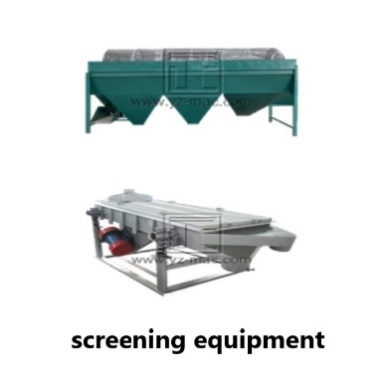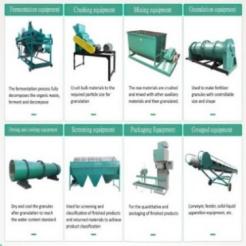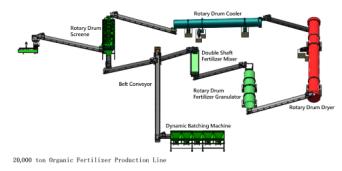Industrial compost screener
Industrial compost screeners play a vital role in streamlining the composting process, ensuring the production of high-quality compost suitable for various applications. These robust and efficient machines are designed to separate larger particles, contaminants, and debris from the compost, resulting in a refined product with consistent texture and improved usability.
Benefits of an Industrial Compost Screener:
Enhanced Compost Quality: An industrial compost screener significantly improves the quality of compost by removing oversized materials, rocks, plastic fragments, and other unwanted debris. This process ensures a refined compost product that is free from contaminants and suitable for a wide range of applications.
Efficient Screening Process: Industrial compost screeners are designed for high-volume composting operations. With their large screening capacity and efficient separation mechanisms, these machines streamline the screening process, reducing labor and processing time while maintaining consistent quality control.
Customizable Screening Options: Industrial compost screeners often offer customizable screening options, allowing operators to adjust the screen size, inclination, and vibration intensity according to their specific composting requirements. This flexibility ensures optimal screening performance for different compost materials.
Scalability: Industrial compost screeners are engineered to handle large volumes of compost. They can efficiently process substantial quantities of compost materials, making them ideal for industrial-scale composting operations that demand high throughput and productivity.
Key Features of Industrial Compost Screeners:
Robust Construction: Industrial compost screeners are built to withstand the demands of heavy-duty composting operations. They are constructed with durable materials, such as stainless steel or high-strength alloys, ensuring longevity and resistance to wear and tear.
High Screening Efficiency: Look for an industrial compost screener with advanced screening mechanisms, such as trommel screens or vibrating screens, that offer high screening efficiency. These mechanisms effectively separate smaller compost particles from larger materials, ensuring a refined compost product.
Easy Maintenance and Accessibility: Consider industrial compost screeners that provide easy access to internal components for routine maintenance, cleaning, and screen replacement. Machines with user-friendly designs streamline maintenance tasks and minimize downtime.
Safety Features: Industrial compost screeners should incorporate safety features, such as safety switches, guards, and emergency stop buttons, to ensure operator safety during operation and maintenance procedures.
Applications of Industrial Compost Screeners:
Commercial Composting Facilities: Industrial compost screeners are integral to commercial composting facilities that process large volumes of organic waste materials. They help refine the compost by removing unwanted materials and ensure the production of high-quality compost for agricultural, landscaping, and soil amendment purposes.
Municipal Composting Operations: Municipal composting operations often handle significant amounts of organic waste from residential, commercial, and institutional sources. Industrial compost screeners aid in processing this waste efficiently, producing refined compost suitable for municipal landscaping projects and soil remediation.
Large-Scale Agricultural Operations: Industrial compost screeners find applications in large-scale agricultural operations, where compost is used as a soil amendment for crop production. These machines ensure the removal of contaminants, resulting in high-quality compost that enhances soil fertility, promotes plant growth, and reduces the need for synthetic fertilizers.
Land Rehabilitation and Erosion Control: Industrial compost screeners are employed in land rehabilitation projects to produce refined compost for soil stabilization, erosion control, and the establishment of vegetation on degraded lands and construction sites.
Industrial compost screeners are essential tools in industrial-scale composting operations, ensuring the production of high-quality compost suitable for a wide range of applications. With their enhanced screening efficiency, scalability, and customizable options, these machines streamline the composting process and contribute to sustainable waste management practices. Consider key features such as robust construction, high screening efficiency, ease of maintenance, and safety features when selecting an industrial compost screener.






